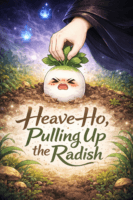I Have A Store C28
by MarineTLChapter 28: Lard Tastes So Good
Once Dachun had placed the wood properly, Zhou Yimin patted him on the shoulder and said, “Come inside for a drink and a smoke. Also, take your corn and potatoes back home later.”
Dachun was about to decline out of politeness, but as soon as he heard about the cigarette and his own family’s grain, he immediately changed his tune: “Thanks, Sixteenth Uncle!”
He was overjoyed!
Zhou Yimin pulled out the pack of Da Qianmen cigarettes from earlier, saw that only two were left, and simply gave them both to Dachun.
Dachun grinned happily and scratched his head, causing his previously flattened hair to spring back up, making him look like he had a messy bird’s nest on his head again.
Once inside, Dachun quickly said, “Sixteenth Uncle, Great Aunt, I won’t drink any water.”
Zhou Yimin pointed to the corner where two sacks lay: “There! Those two bags.”
Dachun chuckled, revealing his yellowed teeth. He twisted his neck left and right, making cracking sounds, then walked over and hoisted the sack of corn onto his shoulder.
A hundred-pound bag, yet he lifted it effortlessly.
People in this era were truly strong. In later generations, many wouldn’t even be able to lift a bag, couldn’t carry anything heavy, and would be gasping for breath after running just a few hundred meters, as if they were about to drop dead.
“Sixteenth Uncle, help me lift this other bag too—”
Before he could finish, Zhou Yimin glared at him. “You can’t make an extra trip? If you drop it, the corn kernels don’t matter, but if the potatoes get crushed, they’ll spoil.”
Besides, carrying such heavy loads all the time—no wonder he wasn’t growing any taller.
Dachun didn’t dare argue after being scolded, so he carried the bag of corn back home first.
As soon as he arrived at his house, before even stepping inside, he shouted, “Dad! I brought the corn back. The potatoes are still at Sixteenth Uncle’s place.”
Zhou Zhicheng came out, his face lighting up with joy. “Good, put it inside. Go back for the potatoes later.”
After setting down the corn, he immediately opened the sack and scooped up a handful of kernels, finding them all dry and clean—no cobs mixed in.
Fair deal!
His eyes then landed on the cigarettes peeking out of his son’s pocket. Without asking, he reached in, took them out, and seeing that there were two, he didn’t hesitate to take one for himself.
“Dad, that’s my—”
“Hmm?”
“My gift to you.” Dachun was fuming inside, but seeing his father’s expression, he had no choice but to change his words.
“Hmm!”
Meanwhile, Dachun’s younger brother had gone to their maternal grandparents’ house to persuade the old couple.
—
At Shangshui Village, once all the sweet potatoes were moved into the communal kitchen’s storage, Village Chief Wang immediately assigned people to start cooking.
Nearly the entire village was weak from hunger.
“Take fifty pounds to Gensheng’s house,” the village chief ordered.
Gensheng was the man who had broken his leg. Fifty pounds of sweet potatoes was considered compensation—there was no more to spare.
Besides Gensheng’s family, the village chief also set aside a few smaller portions—five to ten pounds each—for households that were on the verge of starvation. He had to prevent more people from dying of hunger.
Just yesterday, an elderly man in his seventies had starved to death. He had willingly gone without food so that his family could have enough to eat.
Fortunately, Village Chief Wang commanded enough respect in Shangshui Village that no one openly opposed his allocation.
Soon, the fragrance of cooking sweet potatoes wafted through the communal kitchen, and the entire village lined up for food.
When they saw the sweet potatoes, their faces lit up with happiness.
Throughout history, ordinary Chinese people have been easy to satisfy—just having enough to eat is enough.
“Mom! Can I eat now?” A child, little more than skin and bones, asked his mother.
The pale, frail woman nodded. “Eat, but be careful—it’s hot.”
Inside the communal kitchen, villagers were eating sweet potatoes without peeling them, finally breaking into laughter for the first time in a while.
—
Meanwhile, at Zhou Yimin’s house, his grandmother was rinsing sorghum, preparing to cook sorghum rice. Zhou Yimin was chopping up a chicken—tonight, they were having mushroom stew with chicken.
Laifu and his two siblings hovered around Zhou Yimin, helping with the fire and other tasks.
Zhou Zhimin and his group were out collecting stones—not just any stones, but ones suitable for house foundations. They had already gathered a batch and stacked them on an empty plot near Zhou Yimin’s home.
“Let’s take a break and continue in the afternoon. Time to eat,” Zhou Yimin called out.
Everyone had already smelled the fragrance of cooking sorghum and was hungry.
“Go home and bring your own bowls,” Zhou Zhimin told the group.
In rural households, there weren’t extra bowls. If a bowl broke, it had to be patched up.
That’s right—people even patched up bowls! Many today might not believe it. It’s one thing to patch clothes, but porcelain bowls?
There was even a profession for this—bowl menders. The method involved drilling small holes along the crack, inserting metal staples, and sealing the gaps with a special paste.
Hearing Zhou Zhimin’s words, the group quickly scattered to grab their bowls.
The meal was sorghum rice with potato chunks braised in lard. There wasn’t any meat, but it was still incredibly fragrant.
Zhou Yimin served the food—two scoops of sorghum rice and one scoop of potatoes, filling each large bowl to the brim. The bowls in those days were big enough to bury one’s face in while eating.
Some people only ate two-thirds of their portion.
“Full already?”
One of the men grinned sheepishly. “Not really… I’m saving some for my kids at home.”
Zhou Yimin was speechless. He addressed everyone, “Eat up! After you finish, you can take another bowl home.”
The workers were deeply grateful. They made up their minds to put in extra effort when building Zhou Yimin’s house—after all, they had to repay his generosity.
Zhou Zhimin chuckled wryly. “Yimin, only you would be this generous.”
Sorghum rice was one thing, but those potato chunks were drenched in lard. When mixed into the sorghum rice, the flavor was incredible. No wonder these men wanted to save some for their kids.
“I can’t have them working on an empty stomach, can I?”
Everyone finished one bowl, then took another back home.
Even Zhou Zhimin did the same. Once home, he gathered his wife and kids, pouring a little from his bowl into each of theirs. After splitting it, there was still half a bowl left, which he set aside for his parents.
The children licked their bowls clean, savoring every last bit of lard.
“Mom! Lard tastes so good!”
Zhou Zhimin’s wife ruffled her child’s hair. “It’s good, but there’s no more.”
Only Yimin was this generous. Who else would provide food for their workers and even let them take some home?
Back at Zhou Yimin’s house, he was also eating. He had given the two chicken drumsticks to his grandparents, while he gnawed on the wings and feet. He enjoyed nibbling on these parts—it was more satisfying that way.
He suddenly missed the pickled and spicy chicken feet from his past life.
To his grandparents and the others, however, this just showed his filial piety.
Giving the meat to his elders and younger siblings—if that wasn’t being dutiful and respectful, what was?
“Yimin, eat more of the meat. Let Laifu and the others chew on the bones,” Third Aunt advised.
In these tough times, even getting to gnaw on chicken bones was a luxury—who could expect to eat actual chicken meat?









![Cannon Fodder Refuses to Be a Stepping Stone for His Cub [QT] Cover](https://marinetl.xyz/wp-content/uploads/2025/06/228114s_x16_drawing-143x200.png)
0 Comments